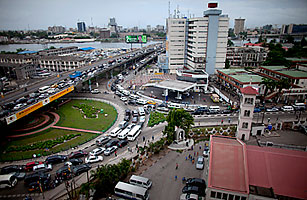
A traffic jam, also known as a go-slow, in Lagos
(3 of 3)
In May 2009, at Fashola's invitation, de Soto went to work for Lagos. Almost immediately, he discovered the mother of all informal economies. A preliminary study revealed that 93.7% of the city's businesses, with assets worth a collective $50 billion, functioned outside the law. That handily beat annual foreign aid to Nigeria ($11.4 billion) and dwarfed foreign investment ($5.4 billion) and, if it could be channeled, would deliver an unprecedented boost to the city's prosperity. It also indicated there was so much about his city that Fashola didn't know or control, de Soto told the governor, that many of his reforms would likely misfire. "If you have that many people outside, it doesn't matter what you say to them," he says. "They're already following rules other than those set by the government."
How to get Lagosians into the system? Property rights, said de Soto. Because of the chaotic way the city had grown, most land and buildings there were untitled, making them difficult to buy, sell or borrow against. But if Fashola were to set clear property rights, that massive asset could be tapped. What's more, since they would benefit, residents and businessmen would line up to have their property counted. They would volunteer to become part of the system. "Since the Domesday Book, people have been linked to their assets and identified themselves through them," says de Soto. "Property rights are the key to finding out how many citizens you've got and who they are and what they're doing. Once you have that, then you can reform the city."
An Ownership Society
For the past 18 months, Fashola has dispatched teams of surveyors across Lagos to determine who owns what. Once they finish, millions of Lagos' citizens will have a stake — legal and enforceable — in their city's future. The transformation will not be immediate, cautions de Soto. "This is what Europe was doing from the 15th to the 19th centuries," he says. "Even at the end of that period, you had these Dickensian cities." But, he says, "once they got that rule of law in place, they became productive."
For Fashola, the law is key. The changes he is overseeing improve infrastructure, create jobs, make money, even build him a soaring political career. But ultimately, the aim is to end the anarchy, he says. A city that does not function "creates desperate conditions for people and reduces their ability to resist temptation." Lapses can be minor, like driving on sidewalks or into oncoming traffic, or major, like violent crime. Fashola sees both as symptoms of Lagos' dysfunction, and he is tackling them by, in one approach, setting up a series of driver-improvement schools as well as, in another tack, employing area boys as cleaners and gardeners to beautify their neighborhoods. It's working. Orderly lanes are becoming the norm on the roads. And crime is down. From 2007 to 2008, armed robberies in Lagos fell 89%. From 2008 to 2009, car theft fell 54%. And murder more than halved, from 221 cases in 2007 to 94 in 2010. This rising sense of citizenship is revealing itself in another surprising way. Astonished then delighted by the transformation their new governor was effecting, Lagosians were happy to pay for it. By 2010 the governor was raising 70% of the state's income locally from taxes. By diminishing the importance of oil money handed out by the federal government and raising the role of local tax, Fashola has reconnected the state to its people. He takes that as a stamp of approval for his efforts to reverse lawlessness in government as well as across the city. "The capacity of a government to attract taxes is a very strong measure of its legitimacy," he says.
And slowly, like a rousing giant, Lagos is emerging from its Dickensian squalor and rediscovering its soul. The city that produced Kuti and Afrobeat and a host of writers like Nobel Prize-winning author Wole Soyinka is witnessing the birth of a hip urban scene. New bars and cafés, boutique hotels and restaurants suddenly abound. Kuti, it turns out, was right. Something as simple as freeing up the roads can free the spirit. "We set out to demonstrate that we can transform ourselves ... that there is nothing wrong with us as a people," says Fashola. "At the beginning, there was uncertainty about whether or not any of this was even possible. [But what we did] was suggest in very practical terms — in ways that are touchable and can be seen — that things can be changed, no matter how bad they are. We restored hope. We restored belief." Lagos, city of hope. How's that for vision?